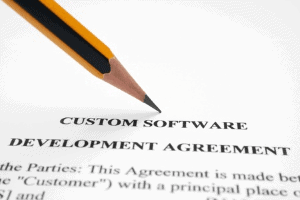
When you’re a software developer, you’ll want to use app development contracts that clients want to sign.
Unfortunately, many developers use agreements that chase prospects away like a fast-talking salesman in a polyester suit.
The most common mistake is to use something that looks like an amateur wrote it. And this happens when the developer “borrows” legal language from multiple agreements and patches it together. In addition to intellectual property theft, it looks like a kid with crayons scribbled it. Not professional.
And if the language is “borrowed” without fully understanding it, chances are many of the terms favor the prospect instead of the developer because that’s how they were drafted.
On the flip side, there’s the “thud factor” mistake. That’s where a software developer presents the prospect with an 80-page contract…something so heavy that it makes a “thud” sound when dropped down in front of the prospect.
These monster contracts typically are filled with “whereas,” “the party of the first part,” and other ancient language designed to induce a coma as the prospect reads each page. In other words, language that could have been used by medieval lords to transfer castles have no business being in a modern tech contract.
If you’re a developer who wants to convert prospects while also protecting yourself and your business, it’s probably time to get a custom software development agreement prepared that you can use as a template for your deals. The first step? Set up a phone consultation with Software Lawyer Mike Young.
